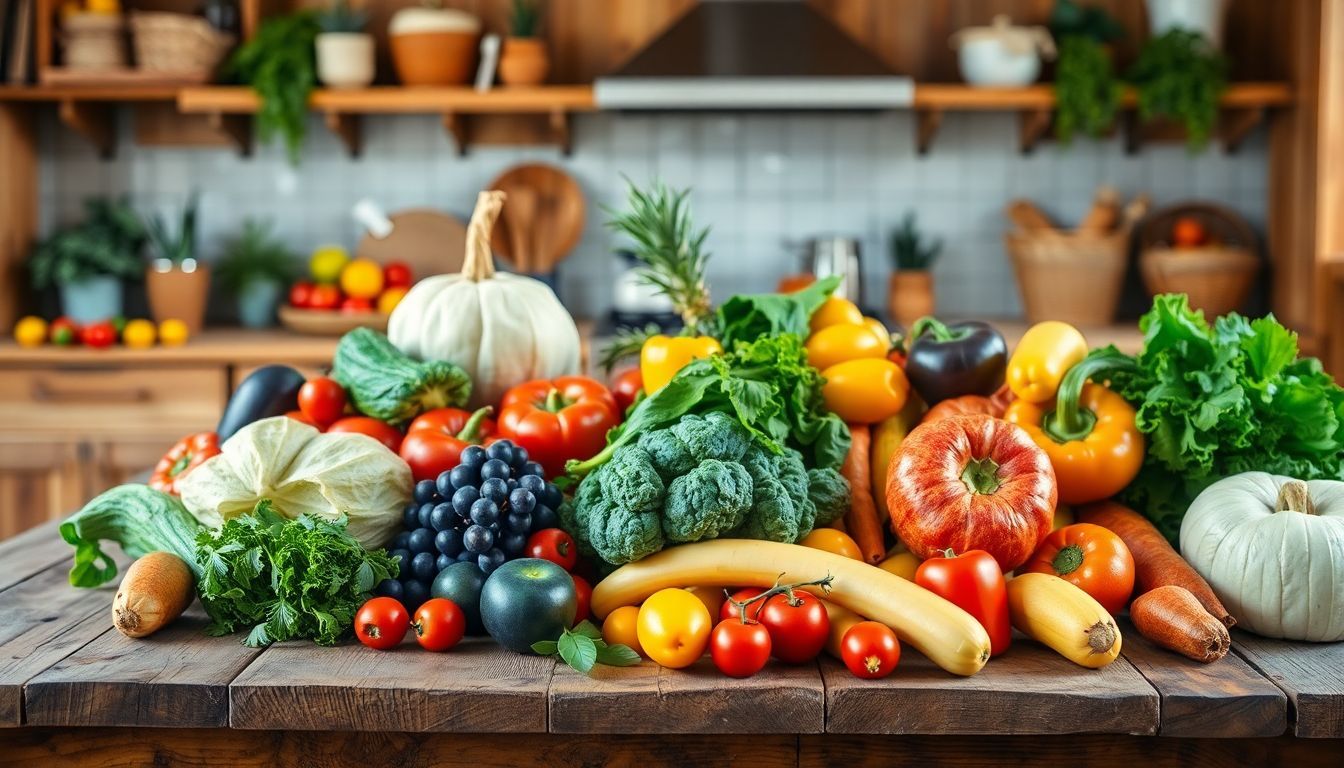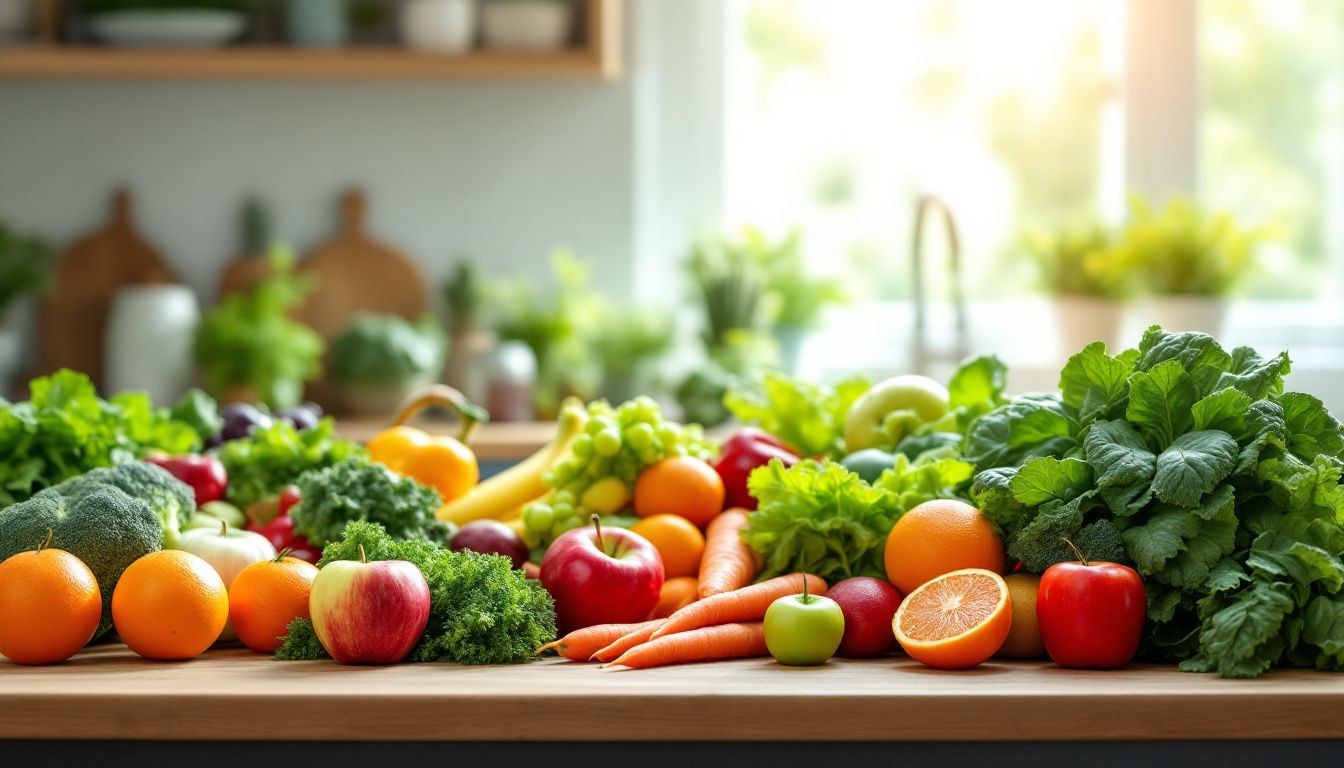Eating right can feel confusing when you’re trying to boost your fitness. Did you know that food is just as important as exercise for athletic performance? This guide will show you the best ways to fuel your body for energy, muscle repair, and recovery.
Thank you for reading this post, don't forget to subscribe!Keep reading—you’re about to learn how nutrition powers success!
Key Takeaways
- Carbohydrates provide energy for workouts. Athletes need over 50% of their daily calories from carbs. Healthy sources include fruits, whole grains, and vegetables.
- Protein repairs and builds muscles. Athletes should consume 1.2 to 2.3 grams per kilogram of body weight daily. Aim for 25-30 grams per meal with lean meats or plant-based options.
- Fats like those from nuts, avocados, and olive oil boost endurance in long exercises. They should make up about 30% of an endurance athlete’s diet.
- Stay hydrated by drinking water regularly and adding electrolytes during intense sessions to avoid dehydration and cramps.
- Timing matters—eat complex carbs three hours before a workout and protein-rich foods within 45 minutes after exercising for recovery support.
Essential Nutrients for Athletic Performance
Eating the right nutrients fuels your body for workouts. Focus on foods that boost energy, repair muscles, and support endurance to perform better.
Carbohydrates for Energy
Carbohydrates power your body during workouts. Over half of an athlete’s daily caloric intake should come from them to maintain energy levels. Your muscles and liver store carbohydrates as glycogen, which fuels physical activity.
During long sessions over an hour, consuming 30-60 grams of carbs every 15 to 20 minutes helps sustain performance.
Healthy carb sources include fruits, vegetables, whole grains, and pastas. These complex carbohydrates provide steady energy without spiking blood sugar levels. For example, a bowl of whole-grain cereals or some trail mix is great for pre-workout fuel.
Eating the right amount keeps your body ready for action—whether lifting weights or running marathons!
Proteins for Muscle Repair and Growth
While carbohydrates fuel your workout, proteins fix and build your muscles. Athletes need 1.2 to 2.3 grams of dietary protein per kilogram of body weight each day for muscle repair and growth.
Aim for 25-30 grams of protein per meal for best results—this supports muscle-building without wasting nutrients.
Lean meats like chicken or turkey are excellent choices. Eggs, dairy products like whole-milk yogurt, and plant-based options such as legumes also pack a punch in protein content. After exercise, women should consume around 20 grams of protein within 45 minutes to speed up recovery.
Protein supplements can help fill gaps but focus on whole food sources when possible for balanced nutrition.
Fats for Endurance
Fats give your body long-lasting energy during endurance activities. About 30% of daily calories for endurance athletes should come from fats, but focus on healthy options. Nuts, avocados, and olive oil are great sources of dietary fat.
These help maintain stamina in workouts that last over an hour.
Avoid vegetable oils like corn and soybean oil as they offer less nutritional value. Omega-3 fatty acids from fish or flaxseeds support muscle recovery after tough sessions. Including a mix of lean meats and antioxidant-rich foods ensures better energy content and performance over time.
Hydration Strategies
Staying hydrated keeps your body working at its best. Proper fluid intake supports energy, focus, and muscle recovery.
Importance of Water
Water helps muscles stay flexible and keeps you moving faster. Dehydration slows your speed, weakens endurance, and raises your heart rate. Even 1% loss of body weight through sweat can lower athletic performance.
“Proper hydration improves flexibility, speeds recovery, and boosts energy during exercise.”
Not drinking enough water increases the risk of heat stroke or muscle cramps. Symptoms like thirst, fatigue, or yellow urine signal dehydration. Aim to drink sports drinks with electrolytes after heavy workouts for better fluid absorption.

Electrolyte Balance
Staying hydrated is not just about water—it’s about keeping electrolyte levels balanced. Electrolytes like sodium, potassium, and magnesium help muscles contract and keep organs working well.
During workouts, you lose salt through sweat. This varies from person to person based on intensity or even the gear you wear.
A good way to replace lost electrolytes is through sports drinks. Choose one with at least 150 mg of salt per 12 ounces for proper balance during intense exercise. Healthy food choices also support this—like bananas for potassium and leafy greens for magnesium.
Without enough electrolytes, you may feel cramps or fatigue faster during training. Keep your levels steady for better athletic performance!
Timing Your Nutrition for Optimal Results
Eating at the right time can boost your workout success. Proper meal timing helps fuel energy and speed up muscle recovery.
Pre-Workout Meals and Snacks
Fueling your body before a workout is key for energy and performance. Eat foods that are easy to digest and packed with nutrients.
- Three hours before exercising, eat a meal with complex carbohydrates. Whole-grain cereals, brown rice, or whole-wheat pasta work well to load glycogen stores. This fuel helps keep energy steady during workouts.
- Thirty minutes before a workout, opt for simple carbs like bananas or trail mix with dried fruits. These provide quick energy without weighing you down.
- Avoid high-fiber foods like beans or broccoli around an hour beforehand. They can cause bloating or discomfort during intense activity.
- Skip dairy if you’re close to training time. Milk and cheese may upset digestion while you move.
- Aim for lean protein if it’s been several hours since your last meal. Chicken breast or turkey slices are light options that help maintain muscle repair.
- Keep fluids in check by drinking water consistently up to workout time—aim for 12-16 ounces in the two hours leading up to it.
Hydration might be the next thing to focus on…
Post-Workout Recovery Nutrition
After a workout, your body needs the right nutrients for repair and recovery. This helps with muscle repair, glycogen storage, and overall performance improvement.
- Eat protein-rich foods within 45 minutes post-exercise. Women should aim for about 20 grams of dietary protein during this time to help with muscle growth and repair.
- Consume 20 to 40 grams of protein every 3-4 hours during the day. This consistent intake supports continued muscle recovery after strength exercise or weight lifting.
- Replenish glycogen stores with carbohydrates. ISSN suggests eating 0.4 grams of carbs per pound of body weight within four hours after exercising.
- Include complex carbohydrates like whole-grain cereals or trail mix in your meal or snack. These offer long-lasting energy compared to refined carbohydrate sources.
- Pair lean meats such as chicken or turkey with olive oil for balanced energy and healthy fats that aid in reducing inflammation caused by intense exercise.
- Add foods rich in antioxidants like fruits, berries, and veggies to fight inflammation faster and protect muscles from damage.
- Hydrate properly by combining sports drinks with water for fluid hydration while restoring lost electrolytes.
- For a quick recovery option, try a high-protein shake blended with fruit to gain both sugars and essential nutrients quickly after finishing your workout session.
- Focus on Vitamin D intake through fortified foods or supplements if needed since deficiencies can slow down physical recovery.
- Plan meals carefully if following special diets like vegan or gluten-free options—include plant-based proteins like lentils but keep their glycemic index (GI) low for steady blood sugar levels instead of spikes causing hunger shortly after eating again!

Special Dietary Considerations
Every athlete has unique dietary needs based on their goals and health. Adjusting your meals can support performance, recovery, and overall well-being.
Gluten-Free and Anti-Inflammatory Options
A gluten-free diet can benefit athletes with or without sensitivities. Avoid traditional breads, pastas, and processed foods. Focus on naturally gluten-free options like quinoa, sweet potatoes, lean meats, and vegetables.
These provide essential carbs for glycogen storage and muscle repair after exercise.
Anti-inflammatory foods support recovery and reduce soreness. Include olive oil, berries, leafy greens, nuts, and antioxidant-rich foods in your meals. Omega-3s from fish like salmon also fight inflammation while boosting heart health.
Vegan and Vegetarian Diets for Athletes
Shifting focus to plant-based diets, vegan and vegetarian options offer many health benefits. These diets can lower risks of obesity, hypertension, and type 2 diabetes. Athletes following these plans must prioritize key nutrients like iron, zinc, calcium, vitamin D, iodine, riboflavin, and vitamin B-12.
Including fortified foods or supplements helps meet daily needs.
Protein is vital for muscle repair and growth. Sources like lentils, tofu, beans, nuts, seeds—and even whole-grain cereals—can provide adequate dietary protein. Eating a mix of these ensures complete amino acid profiles for optimal athletic performance.
Keep meals balanced with complex carbs from vegetables and fiber-rich grains to maximize food energy levels during training sessions!
Fighting Inflammation with Food: Best Anti-Inflammatory Diet Choices
Eating the right foods can reduce inflammation in your body. Tomatoes, olive oil, leafy greens like spinach and kale, nuts, fatty fish such as salmon or tuna, and fruits like berries work best.
These anti-inflammatory choices help fight swelling and pain while improving overall health. Nuts lower markers of inflammation and decrease heart disease risks too. A handful daily offers a mix of healthy fats and nutrients.
The Mediterranean diet helps fight inflammation effectively. It includes whole-grain cereals, lean meats, seafood rich in omega-3s, antioxidant-rich foods like oranges or broccoli—and even red wine occasionally! Olive oil is key for this balanced diet because it’s packed with healthy fats known to combat chronic illnesses like diabetes or joint problems.
This approach makes meals tasty while aiding long-term health benefits.
Supplements and Performance Enhancers
Supplements can boost energy, speed up recovery, and support muscle growth—learn how to choose the right ones safely.
Safe Use of Supplements
Always consult a doctor or sports nutritionist before taking any food supplements. Many performance enhancers, like diet aids or vitamin and mineral supplements, lack enough proof of safety or effectiveness.
Some can even harm your health if misused.
Stick to a balanced diet for most nutrients—skip pills unless advised. Avoid relying on synthetic options when natural foods like lean meats, whole-grain cereals, and antioxidant-rich foods provide better choices.
A sports drinks routine works best when paired with proper meals, not as replacements for them….
Natural vs. Synthetic Options
Natural supplements like antioxidant-rich foods and olive oil often work well with the body. They boost nutrient absorption and lower risks of overdose. For example, trail mix or whole-grain cereals can provide dietary protein and fiber naturally, supporting muscle recovery and satiety.
Synthetic options might be more potent but carry higher risks. These include overdosing or poor absorption compared to natural alternatives. Always consult a sports nutritionist or healthcare provider before choosing between them to avoid health issues.
Conclusion
Eating right fuels your success. Focus on balanced meals, hydration, and proper timing to support workouts. Small choices like whole grains, lean proteins, and healthy fats improve energy and recovery.
Stay consistent with smart nutrition for better performance—your body will thank you!
For more detailed insights into anti-inflammatory diet choices that can boost your athletic performance, visit our comprehensive guide here.
